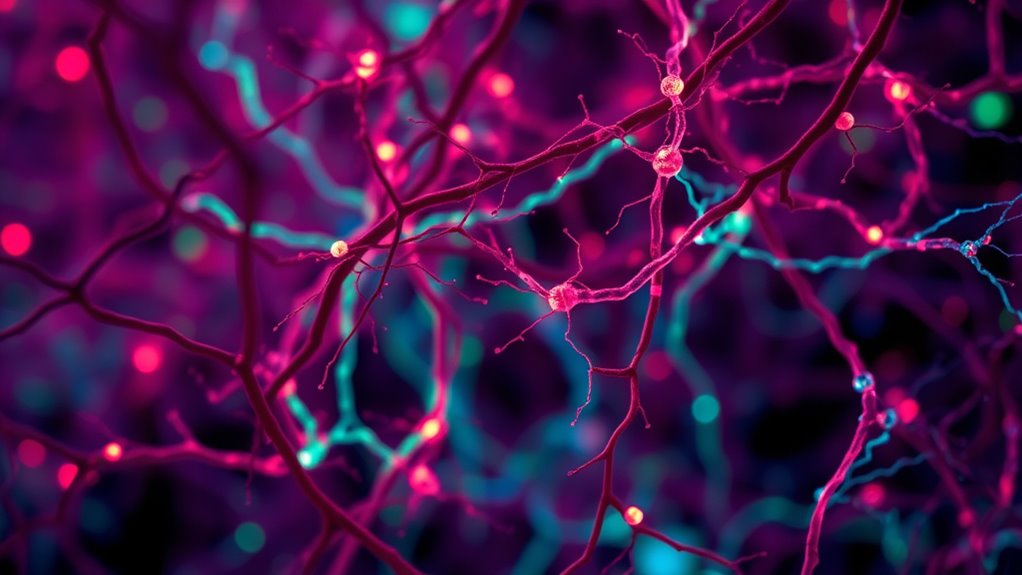Research on the gut-brain axis shows how your gut microbiome affects both mental and physical health. A diverse microbiome helps regulate immune responses, produce mood-enhancing chemicals like serotonin, and prevent inflammation that can harm your brain. When your gut balance is disrupted, it can lead to mental health issues like depression and anxiety, as well as inflammation-related diseases. Exploring this connection further reveals how nurturing your gut could improve your overall well-being and resilience.
Key Takeaways
- The gut-brain axis links gut microbiome health to mental and physical well-being through neurochemical and immune pathways.
- Microbiome diversity supports neurotransmitter production and immune regulation, reducing neuroinflammation linked to mental health disorders.
- Dysbiosis and low microbiome diversity can cause systemic inflammation, impacting brain function and increasing risks of depression and neurodegenerative diseases.
- Strategies like probiotics, fiber-rich foods, and gut barrier strengthening can enhance microbiome diversity and mitigate neuroinflammation.
- Understanding the gut-brain axis emphasizes lifestyle choices that promote gut health, offering potential for improved mental and physical health outcomes.

The gut-brain axis is a complex communication network that links your digestive system and your nervous system, influencing both mental and physical health. At its core, this connection relies heavily on the microbiome—the trillions of microorganisms residing in your gut. Microbiome diversity, or the variety of microbial species present, plays a critical role in maintaining a balanced and healthy gut environment. When your microbiome is diverse, it helps regulate immune responses and produce essential neurotransmitters like serotonin, which directly affect your mood and cognitive functions. Conversely, a less diverse microbiome can lead to dysbiosis, disrupting this delicate balance and potentially triggering neuroinflammation mechanisms that impact your brain health.
Neuroinflammation mechanisms are key pathways through which gut health influences mental health. When your microbiome is imbalanced, harmful bacteria or their byproducts can cross the intestinal barrier and enter your bloodstream, leading to systemic inflammation. This inflammatory response can then activate immune cells in your brain, causing neuroinflammation—a process linked to conditions like depression, anxiety, and neurodegenerative diseases. You might not realize it, but inflammation in your brain can alter neurotransmitter levels, impair neural plasticity, and even damage neurons, creating a cycle that worsens mental health issues. The connection between microbiome diversity and neuroinflammation underscores the importance of maintaining gut health for overall well-being.
Research shows that interventions aimed at increasing microbiome diversity—such as eating a diet rich in fiber, fermented foods, and probiotics—can help reduce neuroinflammation and improve mental health outcomes. These strategies promote the growth of beneficial microbes that produce anti-inflammatory compounds, strengthening your gut barrier and preventing harmful substances from entering your bloodstream. As a result, you may experience improved mood, better cognitive function, and a decreased risk of neurodegenerative conditions. Understanding the mechanisms behind microbiome diversity and neuroinflammation provides valuable insight into how your gut health directly impacts your brain, emphasizing the importance of nurturing your microbiota through healthy lifestyle choices.
Top picks for "brain axis research"
Open Amazon search results for this keyword.
As an affiliate, we earn on qualifying purchases.
Frequently Asked Questions
How Quickly Can Gut-Brain Interventions Improve Mental Health Symptoms?
You might experience rapid symptom relief with gut-brain interventions, sometimes within days or weeks. Immediate intervention, like dietary changes or probiotics, can help improve mental health symptoms quickly, especially if started early. However, everyone’s response varies, so consistent effort and personalized strategies are key. With dedication, you could notice improvements sooner than you expect, making gut-focused approaches a promising avenue for mental health support.
Are There Specific Probiotics Proven to Enhance Gut-Brain Communication?
Yes, specific probiotics can enhance gut-brain communication. Strains like Lactobacillus rhamnosus, Bifidobacterium longum, and Lactobacillus plantarum have shown promising results in supporting gut microbiota health and improving mental well-being. By introducing these targeted probiotic strains, you may positively influence your gut-brain axis, leading to better mood and cognitive function. Incorporating these probiotics into your routine could be a beneficial step toward mental and physical health.
Can Gut Health Influence the Effectiveness of Psychiatric Medications?
Think of your gut as a hidden gatekeeper, influencing how well psychiatric medications work. Your microbiome impact can alter medication absorption, either boosting or hindering effectiveness. When your gut health is balanced, it acts like a well-oiled machine, ensuring medications reach their target. Conversely, poor gut health can create turbulence, reducing treatment success. So, maintaining a healthy microbiome may be key to optimizing your mental health therapies.
What Lifestyle Changes Most Significantly Impact Gut-Brain Axis Health?
You can considerably impact your gut-brain axis health by increasing your intake of dietary fibers, which promote beneficial gut bacteria. Managing stress through mindfulness or exercise also supports gut health, as stress can disrupt the axis. Prioritizing balanced nutrition and stress management techniques helps maintain a healthy gut-brain connection, positively influencing your mental and physical well-being. Small consistent changes make a substantial difference over time.
How Do Genetics Affect Individual Responses to Gut-Brain Axis Therapies?
Your genetics are like a blueprint that shapes how you respond to gut-brain axis therapies. Genetic predispositions influence your body’s reactions, while personal microbiome variations act like unique fingerprints, affecting treatment outcomes. These factors can determine whether a therapy works smoothly or hits resistance. By understanding your genetic makeup and microbiome, you can tailor interventions, making them more effective—like finding the perfect key for your individual lock.
Conclusion
Now that you understand how your gut and brain communicate, isn’t it time to pay closer attention to your gut health? This connection influences not just your physical well-being but your mental clarity too. By nurturing your gut microbiome, you could boost your mood, resilience, and overall health. So, aren’t you curious to explore how small changes might make a big difference? Start today — your mind and body will thank you for it.









